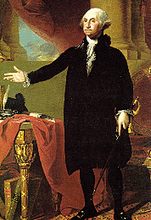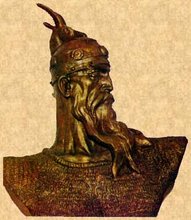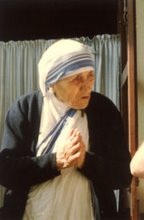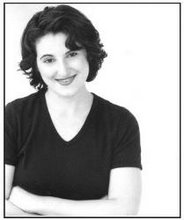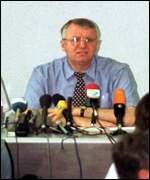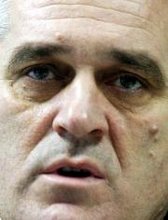Though this excellent (thanx to friend of the blog Francois for the heads up on it) article is a bit long, it's an easy, fast read, and it's gist supports what I've been saying all along: The reason, the
real reason for why Serbian National(Social)ists and their friends and supporters hate, loathe, and despise Albanians has nothing do to with religion, not really, when you come down to it. Religion adds conveinient "rationales" to their hate, but it is not the reason for it. In the final analysis, the
sole reason for it is the same reason that ultimately any bully hates the one who he picks on and harasses: Because that person is
different. Anyway, enjoy this addition to the "arsenal of the truth", and use it.
****************************************
http://www.bosnia.org.uk/news/news_body.cfm?newsid=2386'Skanderbeg was a Serb' - or how Serb national ideology constructed the image of the Albanian as an enemy
Olivera Milosavljevic
Uploaded: Tuesday, 25 March, 2008
The author traces the way in which earlier Serbian historians, writers and politicans created a stereotype of Albanians as implacable enemies of all that is Serb
The Albanians are today unquestionably considered the greatest ‘enemies’ of the Serbs. Although this may be ascribed to political events and the distasteful portrayal of Albanians in the Serbian media, it is nevertheless necessary to look deeper into the reasons for the disdain with which they have been treated by Serbian writers and politicians.
Serbian intellectuals today write about Albanians mainly within the framework of a stereotype about their ingrained hatred of - and desire to destroy - the Serbs, which is said to originate from their very nature, characterised by primitivism and banditry. Earlier authors, meanwhile, sought also to prove the Albanians’ alleged incapacity for autonomous state existence, which they likewise derived from their nature. In their view, the Albanian ‘tribes’ neither needed a state nor were capable of becoming a nation. So such authors saw the solution, in line with Serbia’s own state-political programme, in terms of a benevolent colonisation which, by including the Albanians and their lands into the Serbian state, would prepare them for civilised existence. Contemporary writings about the Albanians commonly include such stereotypes, repeated over and over again during the past one hundred years: that they are not a nation, and that their lack of civilisation precludes them from establishing an independent state. From this derives the assertion that Skanderbeg was a Serb.
Albanians hate Serbs
In the 1980s the Albanian name came to be linked exclusively with words such as genocide, terror, banditry, rape - every mention of this population in both political and private exchange carried a negative connotation. Following Dimitrije Bogdanović’s book Knjiga o Kosovu, published in 1985 by the Serbian Academy of Arts and Science (SANU), and his frequent appearances on television, Serbian intellectuals would write about Albanians only in order to confirm in some form that Serbs in Kosovo were the victims of a planned genocide, so that Bogdanović was soon left behind in this display of negative sentiment against Albanians. In his book, Bogdanović had revived the old thesis that Albanian settlement of Serb lands in the 17th century had left a memory of bloody violence suffered by the Serbs, which he elaborated through examples of collective and individual acts of terror, pillage, pogroms and expulsion of Serbs from their land, and with the assertion that the basis of Albanian settlement was to be found in the conversion of Serbs to Islam, accompanied by ethnic assimilation and brute force. According to him, the Serb people thus became the victim not just of some chaotic movement, but of a pre-planned physical destruction. The extension of this negative image to the Albanian people as a whole was carried out by presenting the Albanian political movement as aggressive, invasive, vengeful, conservative and nationalistic, aimed at destroying the Serb people through murder, expulsion and erasure from history, and at the seizure of Serb land with the intention of surrounding and destroying the Serbs themselves. According to Bogdanović, the thesis of the Illyrian origin of the Albanians was racist, because it was used to establish a primal claim to the territory. At the same time, when writing about the settlement of Serbs in the Balkans at a time that he describes as Albanian pre-history, he mentions the ancestors of the Albanians without saying who they were.
According to historian and SANU member Radovan Samardžić, the Albanians were expansionist already in the 16th century: they were unleashed by the Turks against the Serbs in order to drive a destructive wedge into ancient Serb lands. The Serbs were pushed back by methods that included murder and pillage, the torching of their villages, seizure of their land and enforced Islamisation.
For the sociologist Marko Mladenović too, who made frequent appearances in the media at this time, the genocide and apartheid practised against the Kosovo Serbs was self-evident, and the story about the Albanians’ Illyrian origins was an archaeological fog constructed in order to claim the alleged lands of the contemporary Albanians’ prehistoric ancestors. He insisted that there were no Albanians in Kosovo before the 17th century, and that they were not in a majority there before the Second World War. The persecutors of the Serbs in Kosovo ranged from ‘Bashibazouks’ to ‘Ballists’, associated respectively with Islam and extreme nationalism. This circle of Serbian intellectuals never doubted, moreover, that the Albanians even used children for their political purposes. Bogdanović wrote about Albanian children being encouraged to attack Serb children, while for Mladenović they were used to establish an Albanian numerical preponderance.
A bishop of the Serbian Orthodox Church (SPC), Atanasije Jevtić, insists that the Albanians’ aim in Kosovo has always been the following: more land, more children, and more weapons. He stresses in particular that Albanian children have not merely been manipulated, but feel deep hatred towards everything that is Serb and Christian in Kosovo, for which he blames their parents and teachers, and the primitive clan and Muslim spirit.
While for Bogdanović the Albanians were tools in Turkish hands, for Samardžić they were tools of the Roman curia, which counted on them as people of weak faith and honour, who could accordingly be converted to Catholicism without too much effort. In his portrayal of the Albanian national character, Samardžić speaks of their barbaric nature, their fantastic powers of reproduction, their inhuman odiousness, and their bloody orgies.
During the 1990s, a paradigmatic text written by Miodrag Jovičić appeared in the SANU collection of texts: Serbs and Albanians in the 20th century. The Albanians appear here as ‘Arnauti’ - as marauding bandits genetically predisposed to violence. For Jovičić too, it was their Islamisation that explains why the Turks gave the Albanians carte blanche to terrorise the Serb population through the use of violence, plunder and banditry. Adopting the thesis that tradition and accumulated experience determine a certain biological predisposition in a nation, he argues that violence has become part of the genetic make-up of all layers of the Albanian population, together with hatred of the Serbs, whose only fault is that they are alive.
An approach to historical events as a repayment of debts here comes most directly to the fore. Although Jovičić accepts that in the Kingdom of Yugoslavia the Albanians were not precisely pets of the regime, he nevertheless concludes that they had not by any means paid off the debt for what they had done to the Serb people during the time of Turkish rule. In the same style of earned and unearned history is his observation that, in view of past experience, the Albanian minority simply did not deserve to have autonomy within Serbia. On the contrary, Jovičić argues, many believe that in 1945 the Albanians should have been placed in a special quarantine, and been given autonomy only after they had offered sufficient proof of their capacity for civilised cohabitation. For Jovičić too, then, Albanians are genetic enemies of Serbia and Serbdom , bearers of an aggressive chauvinism and racism, a fact which only serves to prove that it is impossible to create conditions for co-existence of the various national groups who live in Kosovo.
According to this author, Albanians feel a primaeval hatred towards Serbia and Serbdom, and their genocidal behaviour has been present in all centuries. He sees a solution to this problem in altering the province of Kosovo’s existing ethnic composition - by returning all the Serbs who have left, by creating new Serb settlements, and by suspending the present autonomy for a certain period. Contemporary authors have also written about Albanian historical inferiority; about the open genocide perpetrated against Serbs in the 19th century by means of pillage, murder, rape and abduction of women then forced to convert to Islam; about the ethnic and religious intolerance towards Serbs that has formed the basis of all political movements of the ‘Arbanasi’; about their aggressive and destructive fury directed against all that is Serb; about their conduct as invaders and occupiers.
It is argued, with reference to the centuries-old relationship between Albanians and Serbs, that a barbaric and aggressive eruption of Albanian nationalism and separatism occurs whenever the demographic balance is disturbed, which derives from the nature of their primitive clan society; and that in their persecution of the Serbs the Albanians were more radical and cruel than all other Serb neighbours, using the most brutal means, as befits their Islamic-Turkish and fascist-Ballist tradition (Dobrica Ćosić, 1992).
Such negative stereotypes of Albanians were elaborated back in the second half of the 19th century, in books written by Serbian authors based on little serious study. Most widespread was the one about the Albanians’ hatred of Serbs. Archimandrite Hadži Seafim Ristić was among the first to speak of Albanians as the worst enemies of Christianity and the worst oppressors of the common people. Radosavljević-Bdin, inspired by patriotic feelings, when numbering the weapons that the enemies (i.e. neighbours) of the Serbs had used in their joint work of Serb destruction, ascribed the scimitar, gunpowder and lead to the Albanians. Hadži-Vasiljević saw the Albanians as ‘the greatest enemies of the Serbs’ (1906), their ‘sworn enemies’ (1909); he maintained that Serbs saw Albanians as their worst enemies, describing their attitude as follows: ‘Serbs are separated from true Turks by the thickness of an onion skin, and from Albanians by that of a buffalo hide’ (1913).
Skanderbeg was a Serb
The stereotype about Albanians as ‘Arbanised’ Serbs, though seemingly contradicting the above, is in fact in perfect harmony with it, given the view of the phenomenon of assimilation entertained by this part of the Serbian intelligentsia. To begin with, contemporary writers manipulate the number of ‘Arbanised’ Serbs. According to Samardžić, at the end of the 19th century 30-40 per cent of the Kosovo Albanian population was of Slav origin, a result achieved by what he calls a veritable pogrom. For Mladenović, meanwhile, two thirds of native Albanians are of Serb origin. Veselin Đuretić, for his part, insists that the true number is 80 per cent. Earlier authors did not deal in numbers, but found other ways, primarily visual, to deduce the Serb origin of the Kosovo Albanians: in their alleged lack of certain physical features present, for example, among Bulgarians.
The thesis that Skanderbeg was a Serb belonged at once to the stereotype of the Albanians’ Serb origins and to that of their inability to create a state. Its primary purpose was to explain this historical exception from the rule of the Albanians’ tribal and disorganised existence, and their lack of desire for a state. Just as contemporary Serbian writers like to stress that Skanderbeg’s mother was from the Balšić family, which in their view makes him a Serb, earlier writers too felt bound to insist on this argument. For these earlier authors Skanderbeg was a Serb, as were his comrades in arms; he was the last Serb dynast, who ruled lands inhabited by Serbs. Vladan Dorđević, while insisting that Skanderbeg was a Serb, wrote in an apologetic tone: ‘It is actually quite embarrassing that we must claim this sole hero whom the Albanians have managed to acquire during so many thousands of years, for in our six-century-long struggle from Kosovo to Kumanovo we have gained so many heroes that we could have done without this one. But we must not allow history to be falsified for the Albanians’ sake.’ Other authors followed him, repeating in unison that Albanians should not claim Skanderbeg as their own, because he was not a full-blooded Albanian but at least half-Serb.
Albanians are unfit for statehood
The most widespread stereotype in the period up to the First World War was that the Albanians lacked any desire to have their own state, which in turn argued that they had no right to have one. In 1878 Dimitrije Aleksijević wrote that the Albanians had the right to form their state west and south of the Drin, but only if they showed that they deserved it morally, for no state had been ever created by thieves and plunderers. Jovan Hadži-Vasiljević complained that the Albanians had started demanding independence and were denying to the Serbs the right to their lands. On the eve of the Balkan Wars, Ljuba Jovanović wrote that the existing situation in ‘Old Serbia’ had been created by wild and unbridled Albanians whom Istanbul could not pacify; that only Serbia could do that; and that in liberating ‘Old Serbia’ Serbia would also end the barbaric extermination of the Serb population there. According to Jovanović, since the legal science did not recognise the right of possession to something gained by criminal means, Serbia and the Serb people were right not to recognise the legality of the existing state of affairs created through banditry in this famous part of the Serbian fatherland. And while he believed that the Albanians had no right to remain in a land which they had taken by barbaric means, he was not in favour of removing them by force or treating them as an enslaved and conquered mass. He argued that they could stay there as Serbian citizens, without loss of their nationality; but he also concluded that Serbia did not need them.
The years that followed the Balkan Wars produced a plethora of books about the Albanians, their past and their character. Serbia’s primary aim was to reach the sea, and it now redirected its expansion from Salonica to Durrës, in the belief that this was necessary for its economic and political survival. This policy needed scientific arguments to back up its plans. It was now necessary to transfer the old stereotypes about the Albanians of Kosovo and Macedonia to the global plane, and to create a general image of the Albanians that would support the argument that they were not fit to have a state of their own. Serbian nationalist intellectuals, who wrote a great deal about the nationality principle, the awakening of nations, and how the Balkans belonged solely to the Balkan peoples - and who insisted upon the right of every nation to be free - never applied these principles to the Albanians, nor thought that any such rights and freedoms might apply to them. The Serb struggle for freedom, in the eyes of these authors, had to be rewarded with territories that were not necessarily and obviously Serb; while Albanian banditry had to be punished by denying their right to a state even in areas that were purely Albanian. This is why one cannot find a single author among this segment of the intellectual elite who supported the Albanians’ right to have their own state. On the contrary, any such demand was treated as unnatural and an unjust attack against Serbia and its progress.
The desire to prove that Serbia had the right to seize part of Albania in order to have its own coast was so strong that even serious authors succumbed to it. Jovan Cvijić published several articles in connection with the First Balkan War aimed at justifying Serbian political demands. Writing that ‘Old Serbia’ had an exit to the Adriatic Sea in a narrow belt between Shkodër, Lesh and Durrës, he advocated building a railway line to this coast. He was worried, though, that it would pass through Albanian-inhabited areas, saying that this people’s distrust of communications was well known, and that it was also well known that they were very excitable and easily provoked. Serbian demands at this point in time were, in fact, justified not so much in terms of Serb rights, but by an alleged incapacity of Albanians to live as an independent nation. The basic argument was that this primitive people was not fit to have its own state, and would therefore benefit from being exposed to Serb civilisation within a Serbian state.
Jovan Radonić wrote that at the time of the disintegration of the Serbian empire, the Albanians did not try to create their own state, but continued to live as tribes feeling no need for a wider community, thus proving that they did not have the capacity to become a nation. And since these tribes treated everything beyond their own borders as strange and hostile, it was not possible to speak of the Albanian people as a whole. He also argued that the Albanians had not produced their own leaders, but had remained largely subject to the beneficent effects of Serb culture, a state of affairs interrupted by the Turkish invasion. Protesting against the creation of an autonomous Albania that would cut Serbia off from the sea, Radonić insisted that there was no Albanian nationality; that the Albanians did not feel the need to have a state of their own; and that in any case they could not form one, because they showed no cultural disposition, no will, and no capacity to create a state-like community, preferring instead to live as they had done since the middle ages. He complained that this people, who had always been prone to disorder and violence, and who were the strongest opponents of equality, were now supposed to be rewarded with freedom. Rather than being incorporated into the states of the Balkan alliance, where as equal citizens now that Turkey had been defeated they would enjoy the benefits of culture and civilisation, it was now being proposed that they should be independent (Radonić, 1912).
Vladan Đorđević called the Albanians Europe’s Redskins; the Albanian port of Durrës a Serbian port; and the Albanian state that Austria and Italy wished to create a sad episode in the bloody but glorious Balkan epic poem. He asked: ‘Will this tremendous effort by Austria and Italy to create a state out of these Redskins come to anything? And will the colossal damage that the Great Powers will thereby inflict upon themselves be as great as the injustice they will be committing against the Balkans states? Arguing that the Albanians’ backwardness was an unsurmountable barrier to the creation of an Albanian state, he found its surprising that these people - people who did not know what such a thing was, and who thought that snow was sugar - were now claiming to be ready to die for their fatherland. Seeing in the future Albanian state only a barrier to Serbia’s advance, he wrote that the great powers had decided to turn these indolent barbarians into a state solely in order to hinder the progress of other diligent and brave nations, who within a single century had created cultured states through power and application.
Although he wrote his book in order to prove the justice of the Serbian quest for exits to the sea, he also felt the need to point to the profit that would accrue to Europe by Albanians not having their state, arguing that an Albania, being a Muslim state, would be an anachronism for Europe and for its ideals. This is why, in his view, the colonial principle was the only way to solve the Albanian problem, because only a foreign state could create law and order in Albania, and create the conditions that would make it possible for the Albanians to become a nation. Wondering how a people who did not see themselves as constituting a particular nation could henceforth be treated as one, and insisting that the Albanians in their development remained at the stage of pre-history, he concluded that it would take at least a hundred years before they could rightly call themselves a nation. In other words, the slogan ‘The Balkans to the Balkan peoples’ did not apply to the Albanians (Đorđević, 1913).
In the same year that Đorđević’s book was published, the Serbian minister of the interior Stojan Protić published one of his own under the pseudonym of Balkanicus. Although seemingly more moderate in tone, this book used the same arguments and with the same intention. It was published, moreover, by the same publishing house, which makes one wonder whether this was a coordination of efforts to meet given political needs. The main message of Protić’s book too was that it was Serbia’s right to demand an exit to the sea on the Albanian coast. Citing all kinds of ‘scientific’ authorities, Protić argued that the Albanians of northern Albania had lost much of their racial purity, for their blood contained a large Serb component. He repeated the argument that the Albanians had no common language or alphabet, no folk literature or crafts of their own, and noted that it had become fashionable in Italy and Austria-Hungary to portray the Albanians as a talented race and to paint their character in attractive and sympathetic colours.
Against this, Protić quoted a number of foreign authors who had written about the Albanians’ backwardness, concluding that they had remained at the level at which they had found themselves a thousand years earlier. Wondering about the failure of the neighbouring civilisations to influence them, and their inability to evolve into a state community, he concluded sarcastically that such a healthy, spiritual and talented nation - as some gentlemen gave it out to be - had managed to absorb nothing of all their neighbours’ cultures and civilisations, but remained singular and sufficient to themselves. He argued that the Albanians were not capable of independent national existence, because, being committed to self-will and freedom of the wilderness, they did not have nor could have had any feeling for social freedom.
Their reward for their loyal service to the sultan, according to Protić, was permission to kill and exterminate the Serbs, and to seize from the latter their property and land, which was the Albanians’ only talent. Buttressing further his political position, he sought in religion the reasons for deterioration of the relationship between Serbs and Albanians, who in his view had used to be good before becoming Muslims: We have seen in this war too that only Muslim Albanians fought against the Serbs, while Christian Albanians welcomed the Serbs practically everywhere as liberators.
Protić argued that no Albanian question had existed before others had posed it, because the Albanians did not seek a state for themselves. Austria’s fervent advocacy of the lowest and most uncultured race in the Balkan peninsula, which had proved unable to move beyond tribal life for the past two thousand years or to create the smallest state - and its demand, in accordance with the alleged principle of nationality, of extensive borders for this race at the expense of the Serb race, which was stronger, more cultured and far more capable of state life - was in his view nothing but a screen for its own territorial expansion (Balkanicus, 1913)
The key argument of Serbian writings at the start of the century was that Albania was not the product of the Albanians’ national aspirations, and that it did not have the necessary conditions for an independent life, because the Albanians were not nationally united. The state that was being created was not created for them, but as a means to turn the Balkan peninsula into a colony of Great Germany (Cemović, 1913). The idea of independence could not have arisen from among the Albanians themselves, but was the work of others. In this independent Albania, not a single Serb, Christian or indeed Turk would be able to survive (Jaša Tomić, 1913). It was also said that the Serbian army could have taken the area around Vlorë without a fight, but had left it - under pressure from an ill-intentioned Austria - in favour of an independent Albania in which Austria was seeking to multiply, with the aid of its political bacteriologists, the cultures of bandits without ideas, in order to facilitate its own struggle against Serbia, Montenegro and Greece (Stepanović, 1913).
The Albanian character
Yet certain of these authors were ambivalent about the character of the Albanians. Even those who generally painted them in the blackest of colours, when they came into direct contact with them on their travels also acknowledged their many positive sides, which at times even raised them above Serbs. Thus the travel writer Ivan Ivanić described the Albanians of Kaçanik as handsome, tall men known for their bravery, whose love songs were very emotive, because their strong southern blood made them passionate lovers, and reported that guests were fully protected in their homes and their women untouchable (Ivanić, 1903). Hadži-Vasiljević praised their diligence; he stated that their fields and vineyards were of the best quality; that they were the best at animal husbandry and the best craftsmen; that when they had enough to live they were peaceful and good neighbours, and even trusted friends; that they were healthy and tough; that they did not say much, but liked to show off; that they were proud and conceited (Hadži-Vasiljević, 1909). He stressed their moderation, in that they drank little other than coffee; that they ate better than Serbs and cared more than the latter for cleanliness and health; that they were handsome, though not so much their women; and that the pretty women you did find among them derived from an Albanian-Serb mingling, and from beautiful Serb girls having converted to Islam. He said they were hospitable, quiet and polite, sober and clever, but also crafty and jealous (Hadži-Vasiljević, 1913).
Stojan Novaković described them as bony, slim people, healthy and as hardy as flint; but he complained that they were also wild, robbing and often killing every Serb peasant they met (Novaković, 1906). Jaša Tomić acknowledged their military prowess, saying that they were exceptionally skilled warriors, and that no one could accuse them of cowardice; that they did not attack women, and were very hospitable (Tomic, 1913). Although he did not see them as fit to have a state, Toma Oraovac admitted that they were native to the Balkans and one of its more cultured and advanced peoples; while Dragiša Vasić argued that they were supremely more honest and humane than Bulgarians - which is understandable in a book about the Bulgarians (Vasić, 1919).
Interest in Albanians rapidly declined following the formation of a Yugoslav state. They were mentioned in writing only accidentally; negatively, of course, but no longer as the main subject of interest or the main enemy. This role was taken over by Croats, who replaced first the Bulgarians and then the Albanians.
Extracts from ‘U tradiciji nacionalizma ili stereotipi srpskih intelektualaca XX veka o "nama" i "drugima" [In the Tradition of Nationalism, or Serb intellectuals’ stereotypes about "us" and "them"]’, Ogledi no.1, The Helsinki Committee for Human Rights in Serbia, 2002, reproduced on Radio B92's Pescanik [Hourglass] website from which this translation has been made. The original version has a full scholarly apparatus of bibliographical references, for the most part omitted here.




